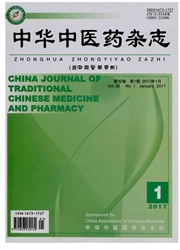

 中文摘要:
中文摘要:
目的:探讨中药复方逍遥散、四君子汤、金匮肾气丸抗慢性束缚性应激的机理.方法:采用单纯束缚的方法建立慢性束缚性应激的大鼠模型,提取海马总RNA,采用RT-PCR反应扩增脑啡肽和前强啡肽基因,比较二者在海马中的表达情况.结果:显示慢性束缚应激时大鼠海马内脑啡呔mRNA和前强啡肽mRNA的表达明显增强,并且时间越长增强越明显.逍遥散和四君子汤都能降低海马内脑啡肽mRNA的表达,三个复方都能降低前强啡肽mRNA的表达,逍遥散的作用明显优于金匮肾气丸.结论:脑啡肽和前强啡肽都参与了海马对应激的调控,对内源性阿片系统的调节是三个中药复方调节应激的重要途径之一.
 英文摘要:
英文摘要:
Objective: To investigate the mechanism of Chinese herbs in resisting chronic immobilization stress. Methods : The rat models of chronic immobilization stress were copied by merely constraint. Total RNA in hippocampus was extracted and primers of enkaphalin or prodynorphin were respectively added for RT-PCR reaction. Then the expressions of enkaphalin and prodynorphin in hippocampus were compared. Results: Enkaphalin mRNA and prodynorphin mRNA expressions in hippocampus markedly increased in chronic immobilization stress and the longer the more evident. Xiaoyao powder as well as decoction of four mild drugs were able to decrease the gene expression of enkaphalin mRNA, and all the three recipes were able to decrease the gene expression of prodynorphin mRNA, and the effect of Xiaoyao powder was obviously outweigh to Jinkuishenqi pill. Conclusion: enkaphalin and prodynorphin both participated in the regulation of hippocampus on stress; the regulation of endogenous opium system was one of the most important ways of the three recipes in accommodating stress.
 同期刊论文项目
同期刊论文项目
 同项目期刊论文
同项目期刊论文
 期刊信息
期刊信息
